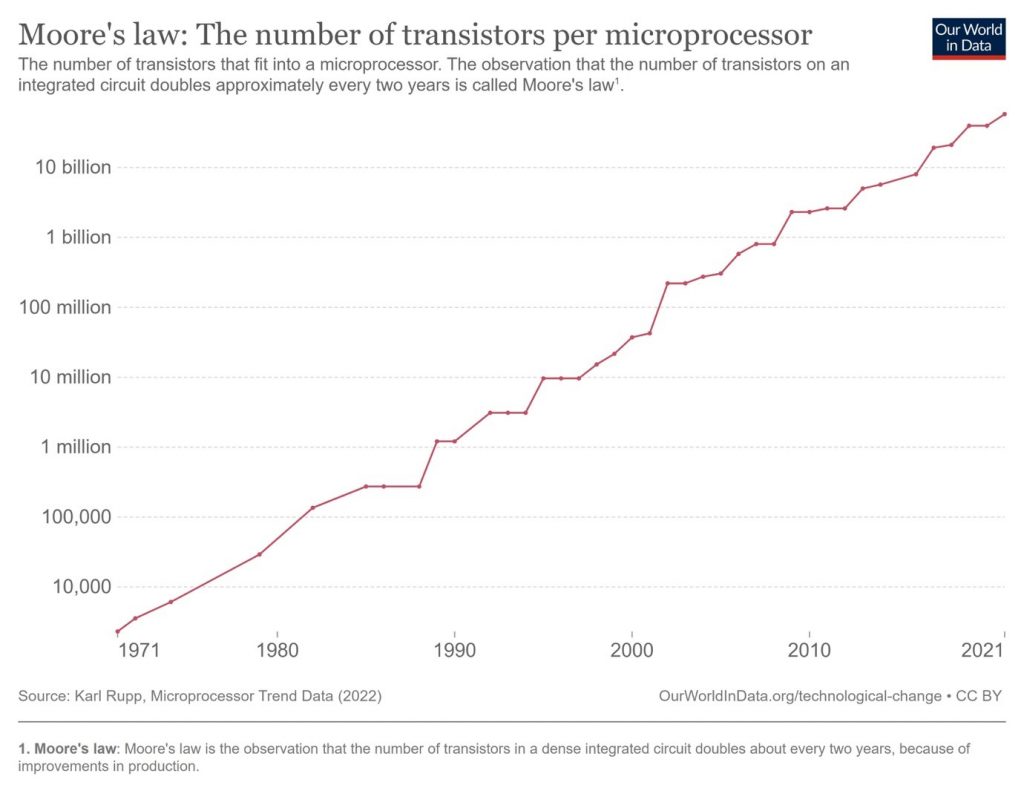Predicting the Future: the passing of Gordon Moore (Moore’s Law)
Mar 31, 2023
The computer world was saddened this week with the passing of Gordon E Moore, an American engineer with a doctorate in chemistry and physics, who became one of the pioneers of the modern electronics industry and a founder of the Intel Corporation. Moore, who originally worked for Nobel Laureate William Shockley (inventor of the transistor), joined a consortium of eight specialists to develop and manufacture silicon-based transistors and integrated circuits. Intel Corporation, which Moore ultimately led, rose to become a leading global power in the manufacture of microchips, a key driver of the global information revolution.
Interestingly, despite his managerial prowess as a leader of one of the true corporate giants of recent decades, Moore will be remembered for a ‘law’ named in his honor. In a special edition of the journal Electronics published in 1965, when asked to predict developments over the next decade (1965-75), Moore made a bold statement that the number of transistors in an integrated circuit (IC chip) would double annually. While perhaps not taken seriously in 1965, over time the eerily steady rate of transistor miniaturization increasingly came to be regarded as an immutable ‘law’ in the electronics industry and beyond – ‘Moore’s Law’ – which (after a revision in 1975) states: the number of transistors per silicon chip will double every two years. In fact, for more than four decades, Moore was a little pessimistic: the doubling phenomenon occurred every 18 months (see chart).
The field of electronics was still in its infancy in the 1960s and disruptive volatility was its defining characteristic. Amidst a constant of change, Moore’s provocative ‘sound bite’ for a publication from 68 years ago stands out as a remarkably prescient act. Many bold predictions about the future have been made, or asserted, over the same time frame. For example, Bill Gates is famously quoted to have said that, “640K (of memory) ought to be enough for anybody.” Perhaps given its laughable inaccuracy, Gates denies making the comment, but did note that computer design at the time (1981) limited the amount of memory that could be accessed by the brand new Intel 8088 processor (manufactured by Moore’s company) being used by IBM personal computers at the time. In a famous quote from 1977, attributed to the then CEO of Digital Equipment Corporation, Ken Olsen stated, “There is no reason for any individual to have a computer in his home.” And then there is the almost certainly apocryphal quote from 1943, attributed to the President of IBM, Thomas J Watson, who allegedly stated: “I think there is a world market for about five computers.” The more believable version is that Watson was speaking about potential orders in the United States for their first production computer designed for scientific calculations. Most would consider the task of invoking technology to make any prediction about the future as futile or foolish.
Moore’s Law is therefore remarkable for its enduring accuracy over a period that has seen such enormous technological change, totally transforming and remaking the lived human experience of the 21st century. Many are now speculating that Moore’s Law is dead or facing its final physical challenge: the so-called nanometric (nm) limit of silicon based chips. This is because certain physical components of chips, especially the wires connecting transistors, face fundamental atomic limitations of potential miniaturization. Various manufacturers are now working on highly specialized photolithographic production techniques for chips built down to 1 nm scale. Some are now discussing the adoption of angstroms rather than nanometers to reflect the photolithographic reality of current chip design and manufacture. Intel, Moore’s old company, has announced the end of the ‘nanometer era’ by 2025, when it will adopt the new angstrom-based system of defining microchip parameters. However, for some, there remains doubt that Moore’s Law has in fact reached the end of its useful life. Many have predicted its demise in the past, incorrectly, as it turns out.
At the very least, for those with a passing interest or connection with electronic technology, essentially every member of humanity, the passing of Gordon Moore this past week deserves a moment of reflection.
Dr. Malcolm Pritchard
Head of School

